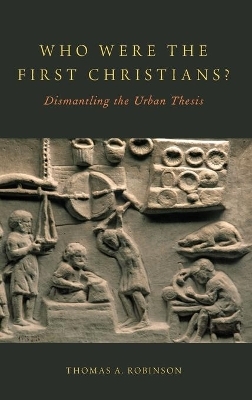
Who Were the First Christians?
Dismantling the Urban Thesis
Seiten
2017
Oxford University Press Inc (Verlag)
978-0-19-062054-7 (ISBN)
Oxford University Press Inc (Verlag)
978-0-19-062054-7 (ISBN)
Thomas Robinson argues that popular views of early Christian growth--one concentrated in urban environments--would nearly saturate every urban area of the entire Roman Empire with Christians, leaving no room for Jews or pagans.
For an understanding of the early Christian movement, two matters are essential. One is the size of the movement. The other is the distribution of the movement. In regard to the first matter, it has been widely assumed that there were 6 million Christians (or 10% of the population of the Roman Empire) around the year 300. But those kinds of calculations have no substantial ancient bases or any modern method by which such numbers can be established. As to the distribution of the movement, the consensus view is that Christianity was an urban movement until the conversion of Emperor Constantine. On close examination, these two popular views-an urban Christianity of 6 million-would nearly saturate every urban area of the entire Roman Empire with Christians, leaving no room for Jews or pagans. That scenario simply does not work. But where does the solution lie? Were there fewer Christians in the Roman world? Was the Roman world much more urbanized that we previously thought? Did large numbers of Jews convert to Christianity? Or, as Thomas Robinson argues, is the urban thesis defective, and the neglected countryside must now be considered in any reconstruction of early Christian growth?
In Who Were the First Christians? Robinson deconstructs the "urban thesis, " and then goes further; he asks what was the makeup of the typical Christian congregation, and whether it was a lower-class movement or an upwardly mobile middle-class movement. In answering these questions, Robinson engages with the influential writings of Wayne Meeks, Rodney Stark, and Ramsay MacMullen, among others. He argues persuasively that more attention needs to be given to the countryside and to the considerable contingent of the marginal and the rustic even within urban populations. The result is that this book effectively dismantles the long-accepted urban thesis, and proves that a profoundly revised vision of early Christian growth and development is required.
For an understanding of the early Christian movement, two matters are essential. One is the size of the movement. The other is the distribution of the movement. In regard to the first matter, it has been widely assumed that there were 6 million Christians (or 10% of the population of the Roman Empire) around the year 300. But those kinds of calculations have no substantial ancient bases or any modern method by which such numbers can be established. As to the distribution of the movement, the consensus view is that Christianity was an urban movement until the conversion of Emperor Constantine. On close examination, these two popular views-an urban Christianity of 6 million-would nearly saturate every urban area of the entire Roman Empire with Christians, leaving no room for Jews or pagans. That scenario simply does not work. But where does the solution lie? Were there fewer Christians in the Roman world? Was the Roman world much more urbanized that we previously thought? Did large numbers of Jews convert to Christianity? Or, as Thomas Robinson argues, is the urban thesis defective, and the neglected countryside must now be considered in any reconstruction of early Christian growth?
In Who Were the First Christians? Robinson deconstructs the "urban thesis, " and then goes further; he asks what was the makeup of the typical Christian congregation, and whether it was a lower-class movement or an upwardly mobile middle-class movement. In answering these questions, Robinson engages with the influential writings of Wayne Meeks, Rodney Stark, and Ramsay MacMullen, among others. He argues persuasively that more attention needs to be given to the countryside and to the considerable contingent of the marginal and the rustic even within urban populations. The result is that this book effectively dismantles the long-accepted urban thesis, and proves that a profoundly revised vision of early Christian growth and development is required.
Thomas A. Robinson is Professor and Chair of the Department of Religious Studies at The University of Lethbridge, Alberta Canada.
Abbreviations
Preface
1. Must Historians Count?
2. The "Urban" Thesis
3. Counting Romans and Christians
4. Counting the Jewish Population
5. Urban and Rural Relationships
6. Supposed Barriers to Christian Success
7. The Pre-Constantinian Evidence
8. Dismissing the Evidence of Christianity in the Countryside
9. The Country Bishop
10. Conclusion
Appendixes
A. The Numbers according to Ramsay MacMullen
B. The Numbers according to Rodney Stark
Bibliography
Index
| Erscheinungsdatum | 30.11.2016 |
|---|---|
| Verlagsort | New York |
| Sprache | englisch |
| Maße | 165 x 242 mm |
| Gewicht | 560 g |
| Themenwelt | Geschichte ► Allgemeine Geschichte ► Vor- und Frühgeschichte |
| Geschichte ► Teilgebiete der Geschichte ► Religionsgeschichte | |
| Religion / Theologie ► Christentum ► Kirchengeschichte | |
| ISBN-10 | 0-19-062054-4 / 0190620544 |
| ISBN-13 | 978-0-19-062054-7 / 9780190620547 |
| Zustand | Neuware |
| Haben Sie eine Frage zum Produkt? |
Mehr entdecken
aus dem Bereich
aus dem Bereich
Was Pompeji über uns erzählt
Buch | Hardcover (2023)
Propyläen (Verlag)
32,00 €
meine Suche nach den Urzeit-Genen
Buch | Hardcover (2024)
DVA (Verlag)
26,00 €


